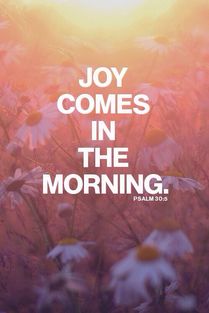 Psalm 30: Weeping may linger for the night, but joy comes with the morning. ...Spring came in March, but then left again. I’m aching for the sun because when the sun returns I’ll get the fresh air I need, I’ll get the exercise I need, when the sun returns I’ll trust that life has returned. We know better, we know life is waiting all winter, that some kinds of life, like certain flower bulbs, need deep cold or they won’t flower in the spring. In this divinely designed world there is an end in every beginning, a time for every season, a purpose for everything under heaven. Thanks be to God. But what is the purpose of the latest shooting on a military base in Texas that left two dead last week? We could write a very long list this morning of the seemingly senseless and certainly heartbreaking violence, cruelty, illness, pain and fear that swirls around us and through us this spring. But our faith teaches us that even this long list has purpose. We might trust that when we look backward, but in the midst of winter, in the midst of hailstorms in a gloomy April, in the midst of a nighttime of tears, trusting the unfolding purpose of our pain and suffering isn’t obvious, it isn’t easy. When we are depleted and anxious and aching, how do we find the energy and creativity to imagine new possibilities, to see around the corner, to trust? ... My friend Ruth Johnston's beautiful poem Resurrection on the Farm speaks to this. Ruth describes the gloomy April as the time when all is hope and nothing else. When the sun doesn’t shine and all we can do is hope for it. When the cancer can’t be treated with surgery or radiation or chemo and all we can do is hope for some kind of healing. When someone we love is spiraling out of control and refuses help and all we can do is hope for some out-of-the-blue intervention or breakthrough. When we can’t change it, we can’t fix it, we can’t force what we need or want out of the world and the people around us, all we have left is hope. Well, we also have despair, depression, resentment, resignation. Those are always available to us. But when we can give up trying to control our lives we are freed up to live in hope. Thanks be to God.... How do we get from crying all night to the joy of the morning? We let go of control, of needing things to be different than they are. We release control and take hold of hope. But that doesn’t mean we’re supposed to be passive or carefree. We also do our best, we say what we need to say, we seek reconciliation, we offer our most earnest, loving selves to the world. Because when we don’t try, we end up with regret, resentment, complicated grief. Like that cliché advice for couples – never go to bed angry. That’s wise! Can you go to bed angry and wake up dancing? Some translations of the Bible call Psalm 30 a psalm of Thanksgiving for Recovery from Grave Illness. It’s a song of gratitude to God. All the psalms are, really, songs of praise to God. But some of the psalms also carry lament and anger to God. “My God, my God, why have you forsaken me” cries Jesus on the cross, and he’s singing Psalm 22. Psalm 22 is a Lament Psalm. The Lament Psalms aren’t easy to read, they can challenge our faith, they certainly shake up simplistic theology that God is good and always wants us to be happy and we should just say thank you. The Lament Psalms are packed with praise, with gratitude, but they start with pain. There’s a formula, a pattern, to Lament Psalms.
As Brethren we tend not to recite the same words over and over in worship. We don’t have a creed, we do say the Lord’s Prayer sometimes but that’s probably the only thing that all of us in this room could recite together from memory. Some short scriptures, maybe John 3:16, but I bet we couldn’t even all recite Psalm 23. And this is because we take seriously ongoing divine revelation, and discernment in community. That means, we believe that God continues to speak into this world and that we can discern God’s guidance and wisdom for our lives when we gather in community to pray, sing, worship, fellowship and serve. These are our spiritual practices, individual and communal. And we keep practicing them and have new words to say each week in worship that come from thousands of years old psalms, and from current poets. The words we share come from our ancestors’ lives and from our lives today. Thanks be to God. But we do rely on patterns, too. Think of Matthew 18:15-19, Jesus’ instructions about how to live with conflict. Just like when we’re suffering and fall back on old habits, and hopefully a lament psalm or two, when we’re in conflict we’re often anxious and angry and aren’t our most compassionate or creative. Matthew 18 gives us a pattern, a habit, to practice so faithfully that even in the midst of painful conflict we can fall back on this habit. Last week in Sunday school we talked about forgiveness, and recalled the Amish community devastated by a man coming into their school, murdering many children, and then killing himself. That very day, members of the Amish community came to his widow’s house with food and offered forgiveness and condolences. Do you think they just started thinking about forgiveness that day? Of course not. Do you think they fully felt forgiveness that day? Of course not. But they took Jesus’ teachings on forgiveness so seriously, they practiced it in daily ways, and when their lives were turned upside down by senseless violence, they had the habit of forgiveness at hand. Thanks be to God. I think the Lament Psalms are like practicing Matthew 18 with God. We don’t turn to God in prayer and pretend nothing’s wrong. That would be a shallow relationship. We demonstrate our trust in God by telling God the truth of our experience, by naming our suffering and frustration, by asking God to continue to be part of our lives. Jesus tells us that when we’re upset with each other we do the same thing – we go to one another and name what we’re experiencing. We ask for continued relationship through this conversation, as hard as it might be to have, we’re demonstrating that we trust each other enough, that we have hope in one another, when we are willing to talk things through. Thanks be to God. With all our suffering and disappointment, by practicing prayer in the best and worst of times, we can truly say Thanks be to God in our nights of weeping, our mornings of dancing, our gloomy Aprils, and the sweetest and sunniest days....
0 Comments
Leave a Reply. |
Archives
January 2022
|

 RSS Feed
RSS Feed